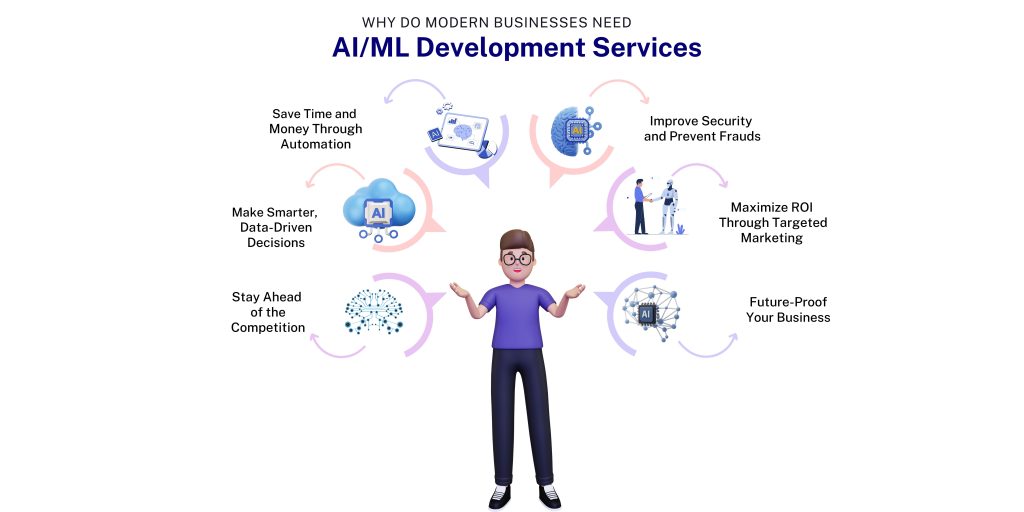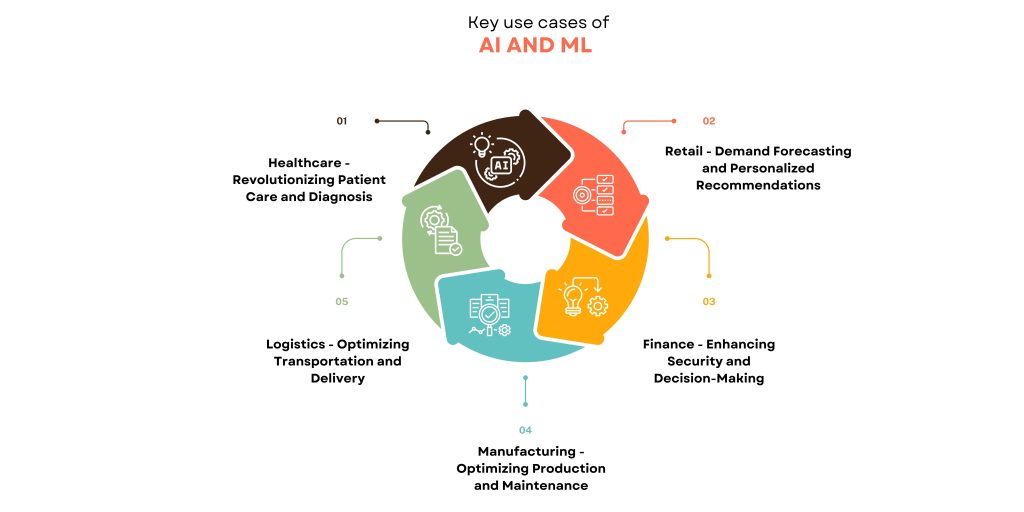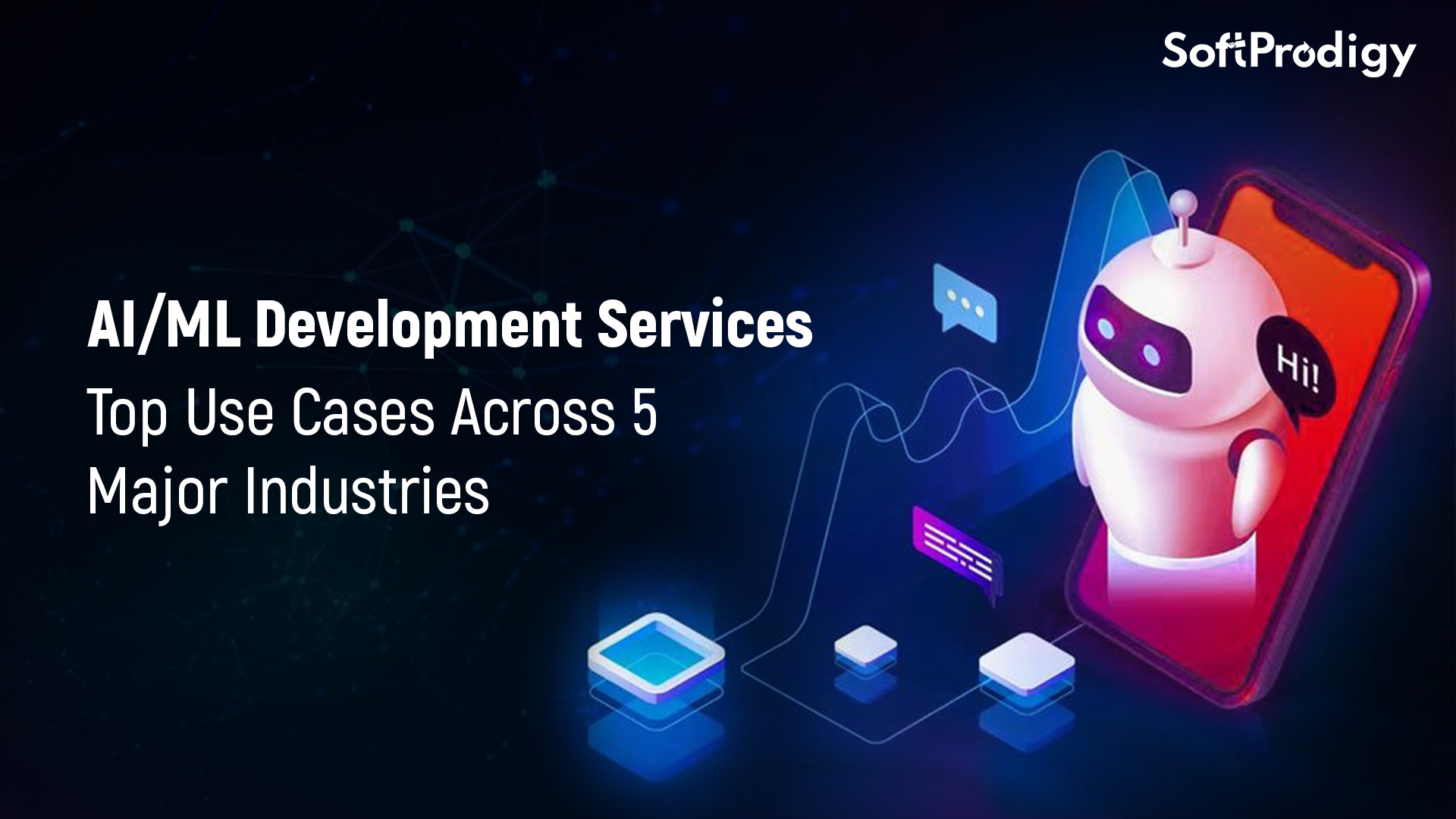Whether it’s demand forecasting, online medical diagnosis, or customer support, AI/ML development services are changing the way we do business. Industries are experiencing a significant digital transition where businesses are becoming smarter than ever. They are relying heavily on artificial intelligence and machine learning to extract insights from massive data volumes, automate repetitive tasks, recommend relevant products, and much more.
• AI in different fields is expected to add $15.7 trillion to the global economy.
• AI/ML could prevent 86% of potential cyber attacks and security threats.
• 42% of enterprise-scale companies report using AI in their business.
This blog post highlights major industries using AI and ML to reap substantial benefits from the applications of these trending technologies. Let’s begin by understanding the role of AI and machine learning development services in driving business growth.
Why Do Modern Businesses Need AI/ML Development Services?

With larger workforces and resources, contemporary business environments are becoming increasingly globalized. Consequently, they face multifaceted challenges ranging from operational inefficiencies to complex decision-making processes. Navigating through these pain points requires constantly adapting to market demands and new technologies like ML, AI, and deep learning.
However, when it comes to effective AI/ML implementation, it requires more than just technical know-how. It also requires foresight and a culture ready to adapt. This is when you should consider AI/ML development services for your business! The benefits of implementation:
• Stay Ahead of the Competition
In this digital age, every edge you have over your competitors can make all the difference. Nearly 3 out of 4 companies have started using AI and ML for at least one business operation. These technologies let you crunch tremendous volumes of data faster than a human could possibly dream of. For instance, an AI-driven recommendation engine predicts customer preferences and needs, so that you can deliver personal experiences.
Just imagine an eCommerce store powered by AI to know everything about the behavior and purchase history of each one of your customers. You could give the most hyper-personalized recommendations, discounts, and reminders. And this alone will make sales go up while customer loyalty is well impossible to beat. That’s the real potential of AI and machine learning development services.
• Make Smarter, Data-Driven Decisions
Businesses today are generating humongous amounts of data, but value is only created from how well they are interpreted. Now, think of AI/ML as a man who never sleeps, helping you determine common patterns and trends which may potentially lead to smarter decisions faster.
For example, AI can use past sales patterns, consumer behavior patterns, and even the public’s sentiment on social media to provide you with actionable recommendations of what to sell, who to sell to, or when to launch that new marketing campaign. This is how your guesswork turns into more calculated, data-driven actions, yielding better business results.
• Save Time and Money Through Automation
No more hours spent slaving through manual entry, sorting, and report creation. Instead, invest in AI/ML development services and start automating those repetitive business tasks on the go. For example, AI-based systems can take care of invoice processing, transaction monitoring, and even compliance checking, allowing businesses to focus on more crucial things.
Through AI, automation is not just the newest trend. Rather, it becomes a business necessity to be managed at peak efficiency. In HR, it can automate recruitment by choosing the ideal candidate whose work descriptions match the job, a process that will drastically shave off hiring time.
• Improve Security and Prevent Frauds
In industries like finance and eCommerce, where security is essential, AI/ML development services offer real-time fraud detection. You can analyze data to spot suspicious patterns before they lead to any financial loss.
For example, a banking institution can use AI and ML models to analyze every transaction in real time, identifying unusual activity patterns far more accurately than traditional systems. By catching fraudulent transactions as they happen, businesses can protect their assets and provide peace of mind to their customers.
• Maximize ROI Through Targeted Marketing
Marketing is no longer a shot-in-the-dark. With AI and ML, you can now run marketing and advertising campaigns that are targeted towards the right person with the right message at the right time. For instance, machine learning algorithms can pick out which products, messages, and channels work for each segment of your customers.
Just think about how social media ads seem to know exactly what you’re interested in. That’s AI/ML at work, determining which products you’re most likely to engage with based on your online behavior. This targeting capability means you’re not just marketing widely; you’re marketing smartly.
• Future-Proof Your Business
Picture this: your competitors suddenly begin to automate complex business processes that you still are doing manually. They are using predictive analytics while you still rely on gut feelings to make business decisions. In this competitive world, AI/ML is no longer an augmentation; it has turned out to be a survival strategy. It is not a trend but the future of business.
The AI market is expected to see an annual growth rate of 36.6% from 2023 to 2030, emphasizing the increasing impact of technologies in the coming years. Investing in AI/ML today means securing your business for tomorrow. So, don’t get behind – embrace AI/ML development services now!
AI and ML Use Cases Across Major Industries

Back in 2017, only 40% of business leaders using AI reported more than 5% of their digital budgets went to AI. However, now more than half of business leaders report that level of investment. Going forward, 63% of organizations expect an increased investment.
As the technology provides a wide spectrum of implementations, the number of industries relying on AI and machine learning development services is quite vast. These solutions can be applied to anything from healthcare and retail to education and logistics. Let’s discover some key use cases of AI and ML:
Use Case 1: Healthcare – Revolutionizing Patient Care and Diagnosis
One of the largest areas of application of AI/ML is healthcare. The global AI in healthcare market is expected to grow at a staggering CAGR of 38.5% from 2024 to 2030. The technology saves lives and transforms patient care by opening unprecedented opportunities for better diagnosis, treatments, and outcomes of patients.
• Analysis of medical records: AI/ML models can portray X-rays, MRIs, and CT scans with unparalleled accuracy. They can detect minor abnormalities that would otherwise go unnoticed by a human eye. These models are better at detecting early indications of malignant growths, cardiovascular conditions, neurological disorders, and more.
• Treatment care management: AI/ML systems are revolutionizing the treatment planning scenario. How? By analyzing patient medical histories, evaluating treatment efficacy across similar cases, and recommending optimal drug dosages. This patient-friendly model leads to improved care of patients at a low cost.
• Personalized medicine: With the innovation of AI-powered platforms, it has become easier than ever to tailor drug prescriptions based on individual genetic makeup. These platforms are designed to provide personalized treatment, increasing efficacy and reducing side effects.
• Efficient medical documentation: Utilizing AI algorithms, healthcare providers can streamline the process of medical documentation. They can now automate structured dictation analysis and manage electronic health records (EHRs) through natural language processing (NLP) and machine learning.
Use Case 2: Retail – Demand Forecasting and Personalized Recommendations
AI/ML is transforming shopping experiences and optimizing operations, creating more personalized and efficient retail environments. Retail businesses are leveraging AI/ML development services to optimize operations and enhance customer satisfaction.
• Personalized shopping experience: AI helps scrutinize customer behavior, preferences, and purchase history, so you can offer tailored product suggestions based on individualized insights. This enhances the overall shopping experience, increases customer engagement, and boosts sales.
• Dynamic pricing optimization: Retailers rely on AI/ML algorithms to analyze market conditions, competitor pricing, and customer demand. This enables dynamic pricing adjustments to ensure optimal pricing strategies to remain competitive in the market.
• Inventory management and demand forecasting: AI helps retailers optimize their inventory by predicting demand patterns, seasonal fluctuations, and industry trends. This helps them minimize overstock and stock outs, lowering holding costs and improving overall supply chain efficiency.
• Customer service: AI-powered chatbots are deployed to provide instant customer support and assist with order tracking. These virtual assistants are crucial in enhancing customer services and delivering prompt responses, addressing common issues with AI chatbot development services.
Use Case 3: Finance – Enhancing Security and Decision-Making
While every major industry is looking to reinvent itself with AI/ML, finance and banking are no exception. The adoption of AI by financial and banking functions has increased significantly, with 58% using the technology in 2024, a 21% rise from 2023. After all, it is now a need of the hour to redefine customer experience, mitigate financial risks, and maximize return on investment.
• Fraud detection: AI and ML systems are utilized in banking for fraud detection and prevention. They analyze transaction patterns, identify anomalies, and flag fraudulent activities, enhancing the security of financial transactions.
• Credit scoring: Credit scoring powered by AI utilizes alternative data sources and ML algorithms to enhance the accuracy of assessing the creditworthiness of individuals and businesses. This leads to more effective risk management, empowering financial institutions to make well-informed lending decisions.
• Anti-Money Laundering (AML) compliance: AI systems can be applied to enhance AML compliance. They automate the analysis of vast amounts of transaction data. Whereas, ML models can detect suspicious patterns and identify potential money laundering activities.
• Process automation: AI-driven automation is transforming the way financial institutions optimize processes. By leveraging technologies like Optical Character Recognition (OCR) and voice-activated programs, organizations can now streamline complex tasks such as document scanning, data extraction, and customer information retrieval.
• Advanced document processing: Finance requires precise data extraction, interpretation, and analysis, which is a time-consuming task. Thanks to AI and ML, it has become easy to enhance such decision-making processes. These technologies reduce manual effort and errors, unveiling valuable information from complex financial data.
Use Case 4: Manufacturing – Optimizing Production and Maintenance
With the widespread integration of AI/ML technologies, the manufacturing sector has undergone a significant transformation. In fact, manufacturers have reported a whopping 50% reduction in production times through the successful implementation of AI/ML development services.
• Defect detection: By using advanced technologies like machine learning and computer vision, businesses can identify flaws with unparalleled precision. They can automate visual inspections, analyze sensor data, and provide actionable insights, making manufacturing processes more efficient and cost-effective.
• Real-time monitoring: AI systems enable real-time monitoring of production lines. They help you collect data from various sources, quickly detect anomalies, and take immediate corrective actions. This facilitates data-driven decisions for continuous operational improvement.
• Quality control: Whether it’s automating visual inspections, or comparing images against predefined quality standards, AI-powered algorithms help detect defects. This level of automation improves quality control and reduces waste, helping manufacturers maintain high-quality standards and minimize defects in their products.
• Predictive maintenance: Equipment failure or breakdown is a big challenge for manufacturing companies. This can lead to delays or even complete shutdowns. Luckily, AI and ML models help analyze time-series data to predict equipment failures before they happen. Plan in advance for any unforeseen delays in production.
Use Case 5: Logistics – Optimizing Transportation and Delivery
Due to global disruption and lack of transparency, businesses across all industry verticals are optimizing their supply chains with AI/ML development services. This makes them less vulnerable to the ever-changing market demands and dynamics.
• Warehouse management: Leverage AI and deep learning models to analyze past historical trends. Uncover hidden patterns to prevent over or under-stocking, always staying cash-flow positive.
• Optimal routing: Collect and analyze a vast amount of data from various sources to build statistical models using machine learning. This will help you determine the most efficient routes for delivering shipments.
• Predictive maintenance: Predicting failures via advanced AI analytics increases equipment uptime. Take advantage of distributed systems and process huge volumes of data in parallel, significantly reducing maintenance costs by detecting faults in advance.
• Resource management: AI and ML models also enhance resource management by analyzing workload data, such as order volumes and processing times. This is a great way to optimize task allocation among human workers, ensuring tasks align with employees’ skills and availability.
Summing Up
As technology evolves and gets better, AI/ML takes the lead as the most significant driving force for digital transformation across different industries. This includes several other verticals, including real estate, media, and telecommunication.
Businesses using AI and machine learning development services are currently seeing significant improvements in productivity and decision-making, with sectors like finance, healthcare, and logistics leading the charge. But what we have witnessed merely scratches the surface of the extensive capabilities of AI and ML. So, are you ready to leverage AI/ML development services? Let’s connect!
FAQs:
What challenges do AI and ML resolve?
AI and ML systems can address a wide range of challenges, from data analysis and automation to personalization and predictive analytics. Some other challenges these systems can solve include:
• Data overload
• Human error
• Fraud detection
• Demand forecasting
• Complex problem-solving
What are the applications of AI and ML in the travel sector?
AI and ML are reshaping the travel sector by enhancing customer experiences, optimizing operations, and improving safety. Some impactful applications of AI and ML in the travel industry include:
• Efficient customer support with AI chatbots
• Personalized recommendations
• Dynamic pricing strategies
• Predictive analytics
• Language translation
What are the top use cases of AI in software development?
Whether it’s automating code reviews, identifying bugs, generating code snippets, or even writing basic test cases, AI automation is a great way to free up developers for more complex tasks. By adopting AI-driven tools, software teams can increase productivity, build better software, and create more innovative and user-centered applications.
What are the risks associated with AI/ML implementation?
Some risks include data privacy concerns, algorithmic bias, and dependency on high-quality data. So, it’s essential to ensure data is handled responsibly for fairness and accuracy. This is where working with an experienced data engineering company can help you mitigate these risks and ensure a secure, ethical implementation.
Why choose SoftProdigy to create an AI use case for my business?
As a leading provider of AI/ML development services, we turn every possible idea into reality. Partnering with us brings highly skilled developers and AI analysts to the table, which drives innovation and a competitive edge. On top of that, we cater to a wide range of industries and businesses, ranging from sports and media to healthcare and real estate.











